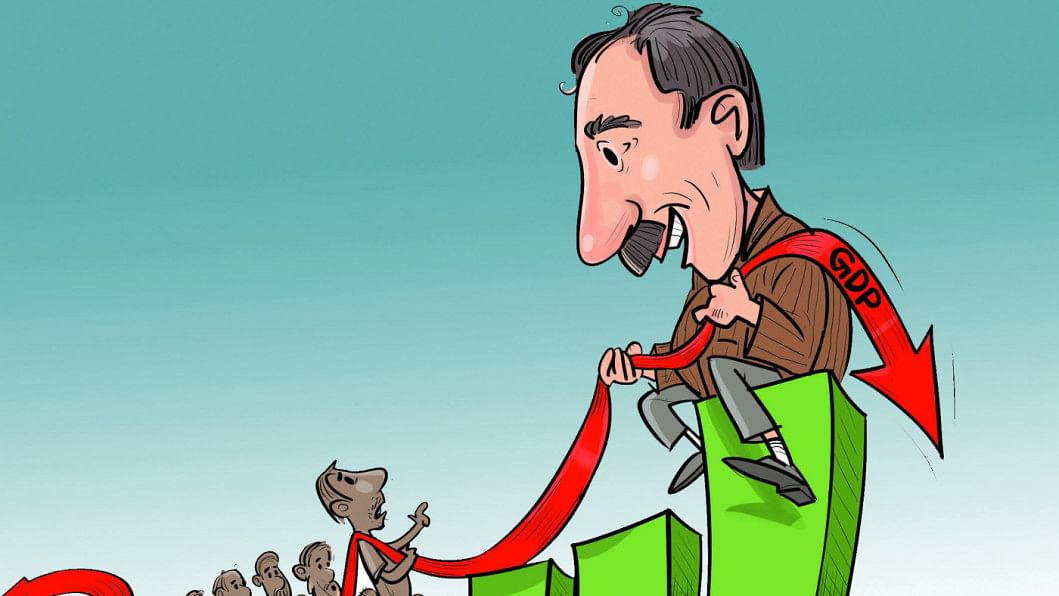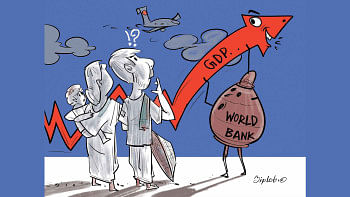What is holding Bangladesh's GDP growth rate down?

The other day, I was engaged in a conversation with some of my associates in the city of Cambridge. One of my friends, a professor of economics at the University of Massachusetts, Boston, quizzically looked at me and said, "I think the Bangladesh government is hurting the country's GDP growth rate by obsessing with the GDP growth rate." It gradually dawned on me that he was referring to a well-known paradox: "GDP fetishism." As Joseph Stiglitz, the Nobel Prize-winning economist put it, "If we have poor measures, what we strive to do (say, increase GDP) may actually contribute to a worsening of living standards."
In addition to poor measurement, we have repeatedly pointed out that the country's GDP growth is crimped by three well-known curses: rampant corruption, rising inequality, and continuous financial mismanagement. Econometric simulations have shown that we could have achieved a double-digit GDP growth rate if we had urgently addressed these three perennial problems.
In the interest of showing that our national income is growing very fast, government officials are promoting megaprojects at the cost of efficiency. In addition, statistical offices are making up numbers that often conceal the actual cost of the choices of projects or technologies. For example, for the Matarbari power plant project, the cost per megawatt (MW) capacity basis is around USD 5 million compared to a range of USD 488,000-657,000 for four similar-sized plants in China, or 8 to 10 times more expensive.
In the long run, the pursuit of GDP growth at the expense of people's well-being will bring down the growth rate, and hurt the people whom the elected officials should serve. In the short term, the rush to finish megaprojects before the 2024 elections has lowered the GDP by one percent.
We are not alone in this regard, though. A few years ago, a study showed that China overreported its economic growth between 2008 and 2016 by an average of 1.7 percentage points. The discrepancy came from local governments who were rewarded for meeting growth and investment targets.
Can't the ruling party, which is aiming to come to power again through the forthcoming 12th parliamentary election, also put lowering corruption, improving the healthcare system, and providing better nutrition on its list of priorities? Can't our leaders initiate a crusade like Ukraine's President Zelensky, who fired some of his key lieutenants tainted by corruption?
There is compelling evidence that addressing high and growing inequality is critical to promote strong and sustained growth, and needs to be at the centre of the policy debate, said OECD Secretary-General Angel Gurría. "Countries that promote equal opportunity for all from an early age are those that will grow and prosper."
Rising inequality is estimated to have knocked more than 10 percentage points off growth in Mexico and New Zealand over the past two decades up to the Great Recession. In Italy, the UK and the US, the cumulative growth rate would have been six to nine percentage points higher had income disparities not widened, as well as in Sweden, Finland and Norway, although from low levels. On the other hand, greater equality helped increase GDP per capita in Spain, France and Ireland.
Bangladesh's obsession with the GDP growth rate is simultaneously causing collateral damage. It is taking our collective attention away from the government's obligation to our people to provide jobs, nourishment, and protection from the vagaries of nature. Our obsession with GDP growth is not what will help us; rather, we ought to strengthen our social safety net and healthcare services. Around 30 percent of people in Bangladesh are facing food insecurity, according to a World Bank survey.
Empirical evidence suggests that corruption reduces the ratio of investment to GDP, lowers investment and disrupts economic growth to a significant extent. Even our own Anti-Corruption Commission (ACC) estimates that corruption reduces our GDP growth rate by three percent.
According to the World Bank, the average income in countries with a high level of corruption is about a third of that in countries with a low level of corruption. Also, the infant mortality rate in such countries is about three times higher and the literacy rate is 25 percent lower.
What accounts for this obsession with the GDP growth rate? I would guess that the national election cycle may be to blame. The ruling party has depended on growth for political legitimacy. But even in terms of GDP growth, there are significant failures. I recall that in 2018, the prime minister said if her party came to power again, the country's growth would reach 10 percent within the next five years. Well, that did not happen. The focus on GDP is coming back again this year now that another round of parliamentary election is on the horizon. In December, the prime minister declared, "I believe and I can assure everyone that we will be able to achieve our targeted growth rate." I have also seen projections that our country is "on track to be a trillion-dollar economy by 2040."
It is understandable that during an election year, growth in income or other catchy phrases like "middle-income country" have a better appeal in the news media. However, we must also look at the other metrics that have a rightful place in our national dialogue as we try to attain sustainable development.
Dr Abdullah Shibli is an economist and works for Change Healthcare, Inc., an information technology company. He also serves as senior research fellow at the US-based International Sustainable Development Institute (ISDI).

 For all latest news, follow The Daily Star's Google News channel.
For all latest news, follow The Daily Star's Google News channel. 










Comments